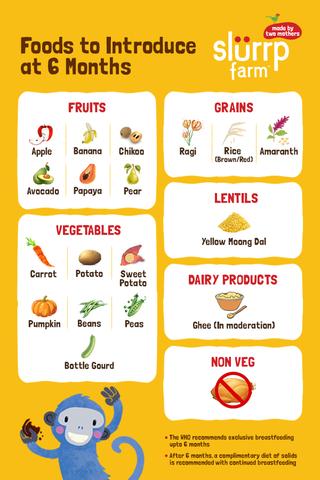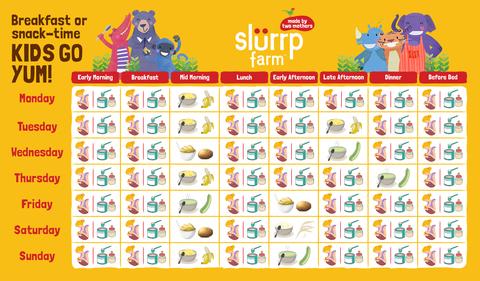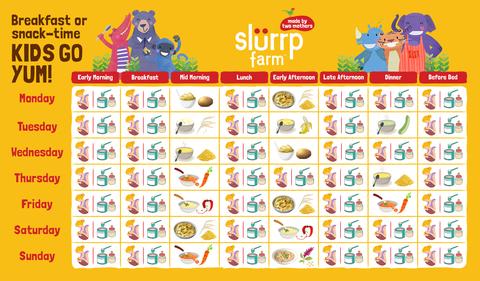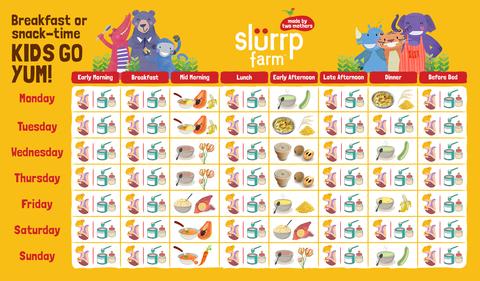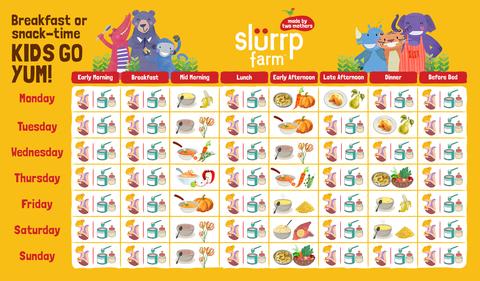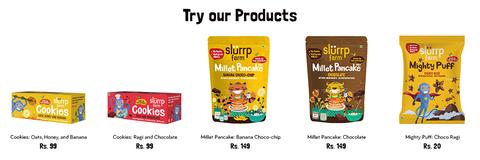You may find it hard to believe, but, dear momma, you and your little one have made it halfway through the first year! Yay yay and big congratulations! Six months have passed since your baby stepped in this world and has started to learn how to communicate and is also ready to start solid foods.

What happens at 6 months?
At 6-months, your baby must have developed the digestive enzymes that are needed for digestion of simple foods. It’s about time to introduce some juicy flavors in his/her diet and discover what is relished by them. It would be so much fun to see their cute little faces, full of adorable expressions when they try these new flavors for the very first time, right?
However, always keep in mind that…
Solid food can never replace the nutrients that a child receives from breast milk or formula milk in the first year of their life. Therefore, solids should be given along with continued breastfeeding. So, all the mommies out there, please make sure that the solids that you introduce in your child’s diet plan are just complementary to the nutrients that they need from the breastfeeding.
Hence, breastfeeding/formula milk should be continued…
We understand how stressful it is to plan the daily diet-plan of your baby. So, here are weekly plans represented in our week-by-week, 6 Months Baby Food Chart for Indian Infant.
Week 1:
Start the week by introducing a fruit i.e., mashed banana, one time a day. Feed it twice the next day. On the third day, you can introduce vegetables, mashed potato (morning) and thick bottle gourd soup (afternoon). Feed a combination of fruits and vegetables on the fourth day, i.e., mashed banana (morning) and thick bottle gourd soup (night). Let thick bottle gourd soup be the first solid meal for the fifth day followed by mashed potato (afternoon). Feed mashed potato and rice gruel on the sixth day followed by mashed banana and thick bottle gourd soup on the last day of the week.
Click on the image to take the print
Week 2:
Start the second week with mashed potatoes (morning) and plain rice moong dal khichri (afternoon). On the second day of the week, you can feed the little one thrice a day: plain rice gruel (morning), mashed banana (afternoon) followed by thick bottle gourd soup (dinner). The third day will have 2 meals, thick moong soup (morning) and mashed potato (afternoon). For the fourth day, you can introduce a new vegetable, carrot puree (morning) followed by thick moong soup (dinner). The fifth day will have 3 meals again, apple puree (morning), khichri (afternoon) and carrot puree (dinner). Feed moong dal and rice khichri (morning) and apple puree (afternoon) on the sixth day, followed by carrot puree (morning) and amaranth cereal (afternoon) on the last day of the week.
Click on the image to take the print
Week 3:
The third week will start with pureed papaya and mashed banana (morning), thick bottle gourd soup (afternoon) and moong dal rice thin khichri (dinner). On the morning of the second day, feed the same food as the previous day followed by dal rice khichri (afternoon). The third day introduces the most important ingredients i.e., Ragi. Feed ragi porridge (morning), chikoo smoothie (afternoon) and bottle gourd soup (dinner). Repeat the same food on the fourth day. Introduce mashed sweet potato (morning), thick dal soup (afternoon) and mashed banana (dinner) on the fifth day. The sixth day will have papaya puree (morning) and mashed sweet potato (afternoon) followed by carrot puree (morning), ragi porridge (afternoon) and bottle gourd soup (dinner) on the seventh day.
Click on the image to take the print
Week 4:
Start the fourth week with mashed banana (morning) and stewed pear (afternoon). On the second day of the week, feed Ragi Porridge (morning), pumpkin puree (afternoon) followed by stewed apple and pear (dinner). The third day you can introduce beans with carrot puree (morning) and ragi puree (afternoon). For the fourth day, feed mashed and pureed fruits (morning), peas and carrot puree (afternoon) and vegetable khichri (dinner). For the fifth day, you can feed pumpkin puree (morning), yellow moong dal (afternoon) and mashed banana (dinner). The sixth day will have ragi porridge (morning), stewed potato puree (afternoon) and thick dal soup (dinner) followed by ragi porridge (morning) and vegetable khichri (afternoon) on the last day.
Click on the image to take the print
|
Disclaimer:
1. Make sure to follow the 3-day rule. Note down the new ingredients introduced in the baby’s diet to look out for any allergic reactions 2. It is common for babies to reject unfamiliar foods, as they wean. Be patient and keep offering a variety of foods. Do not worry, this is perfectly normal 3. Please remember that some foods can irritate your baby’s digestive system. Avoid highly spicy or greasy foods. Also, avoid foods that could easily cause choking 4. If your baby as several episodes of vomiting after trying new food, has diarrhea, develops a rash, or has swelling of the lips or eyes, he or she may be having an allergic reaction. Stop the feeding and call your pediatrician |
Did you know?
Ragi has 10X more calcium than Wheat and Rice. Jowar is one of the richest sources of dietary fibre, while Lentils are a powerhouse of plant proteins.
 This post is co-authored by Ms. Aditi Mehrotra, two-time gold medalist- health educator, DIETED & Co-founder, Arney’s Fitkids- School Nutrition Program. Her diet dictate is: “Diet is not a deprivation but a slight deviation from the normal. Love yourself! Make yourself a priority. Nourish your body and soul!”
This post is co-authored by Ms. Aditi Mehrotra, two-time gold medalist- health educator, DIETED & Co-founder, Arney’s Fitkids- School Nutrition Program. Her diet dictate is: “Diet is not a deprivation but a slight deviation from the normal. Love yourself! Make yourself a priority. Nourish your body and soul!”
